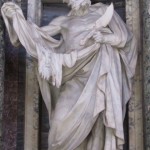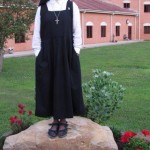That night, I asked the Mother of God what was to become of me, a Child of Faith. Then she came to me holding two crowns, one white, the other red. She asked me if I was willing to accept either of these crowns. The white one meant that I should persevere in purity, and the red that I should become a martyr. I said that I would accept them both. — Saint Maximilian Mary Kolbe
It is fitting that we today anticipate the Feast of the Assumption of Mary by remembering a saint whose devotion to the Blessed Mother informed and inspired a heroic life lived energetically — and subversively — for Christ:
Only a few days ago, we remembered and honored a the great Carmelite philosopher and saint Edith Stein, who was killed at Auschwitz, and today we remember another highly-educated twentieth-century martyr, the great Franciscan friar (and philosopher, theologian, astro-physicist and publisher), Kolbe, Saint of Auschwitz.
Maximilian Kolbe was a Polish priest who died as prisoner 16770 in Auschwitz, on August 14, 1941. When a prisoner escaped from the camp, the Nazis selected 10 others to be killed by starvation in reprisal for the escape. One of the 10 selected to die, Franciszek Gajowniczek, began to cry: My wife! My children! I will never see them again! At this Maximilian Kolbe stepped forward and asked to die in his place. His request was granted …
In fact, what Kolbe said was, ‘I am a Catholic priest. Let me take his place. I am old. He has a wife and children.’
A Catholic priest! How could evil refuse the offer?
He is greatly remembered for his self-sacrifice in Auschwitz — and there is so much greatness to read of, from the testimony of eye-witnesses:
A personal testimony about the way Maximilian Kolbe met death is given by Bruno Borgowiec, one of the few Poles who were assigned to render service to the starvation bunker. He told it to his parish priest before he died in 1947:
‘The ten condemned to death went through terrible days. From the underground cell in which they were shut up there continually arose the echo of prayers and canticles. The man in-charge of emptying the buckets of urine found them always empty. Thirst drove the prisoners to drink the contents. Since they had grown very weak, prayers were now only whispered. At every inspection, when almost all the others were now lying on the floor, Father Kolbe was seen kneeling or standing in the centre as he looked cheerfully in the face of the SS men.
Father Kolbe never asked for anything and did not complain, rather he encouraged the others, saying that the fugitive might be found and then they would all be freed. One of the SS guards remarked: this priest is really a great man. We have never seen anyone like him ..
Two weeks passed in this way. Meanwhile one after another they died, until only Father Kolbe was left. This the authorities felt was too long. The cell was needed for new victims. So one day they brought in the head of the sick-quarters, a German named Bock, who gave Father Kolbe an injection of carbolic acid in the vein of his left arm. Father Kolbe, with a prayer on his lips, himself gave his arm to the executioner. Unable to watch this I left under the pretext of work to be done. Immediately after the SS men had left I returned to the cell, where I found Father Kolbe leaning in a sitting position against the back wall with his eyes open and his head drooping sideways. His face was calm and radiant ..’
So it was that Father Maximilian Kolbe was executed on 14 August, 1941 at the age of forty-seven years, a martyr of charity. The death certificate, as always made out with German precision, indicated the hour of death 12.30.
Father Kolbe’s body was removed to the crematorium, and without dignity or ceremony was disposed of, like hundreds of thousands who had gone before him, and hundreds of thousands more who would follow.
The heroism of Father Kolbe went echoing through Auschwitz. In that desert of hatred he had sown love. A survivor Jozef Stemler later recalled: ‘In the midst of a brutalization of thought, feeling and words such as had never before been known, man indeed became a ravening wolf in his relations with other men. And into this state of affairs came the heroic self-sacrifice of Father Kolbe.’ Another survivor Jerzy Bielecki declared that Father Kolbe’s death was ‘a shock filled with hope, bringing new life and strength … It was like a powerful shaft of light in the darkness of the camp.’
He’d been arrested, in part, for hiding and assisting Jews — 2000 of them. Subversive. He consented to being thrown into a hole and starved to death; asks for nothing, remains cordial and relies wholly on hymns and prayers and psalms and canticles. Such subversive power, in all of that — subversive and victorious. The world calls faith stupid and mocks it. That’s why the world will ultimately lose.
I have this last image set as my wallpaper. Every time I see his good, open face, I feel him asking me, “and what small thing — what small, subversive thing — have you done, today, Elizabeth, to counter the empty illusions of the world and advance the Kingdom of Heaven?”
Related:
New Advent with a really good video
Saint 16670 dies for 5659













